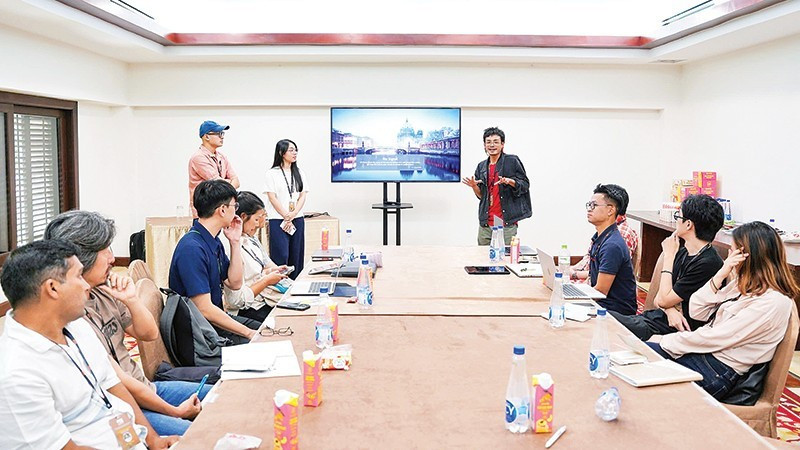Among the emerging young filmmakers who have garnered international awards are Pham Thien An with “Inside the Yellow Cocoon Shell”, Ha Le Diem with “Children of the Mist”, and Pham Ngoc Lan with “Cu Li Never Cries”.
However, these alone are not enough to build a solid foundation or a distinctive identity for Vietnamese cinema.
In reality, the majority of the current filmmaking workforce still consists of "non-specialists" who lack both formal, structured training and sufficient hands-on practice environments.
Experienced director Dang Nhat Minh has also expressed concern — not about a lack of passion, but about the lack of a solid foundation for the next generation.
Specifically, there is a shortage of internationally standardised training environments, sustainable support funds, and a cohesive linkage between training, production, and distribution.
Recently, the "Project Incubation" programme at the Da Nang Asian Film Festival 2025 has made efforts to invest in human capital — the core of a sustainable cinema industry.
Unlike short-term workshops designed primarily for introduction, this project created a small but meaningful ecosystem. Here, young filmmakers had the opportunity to engage with international professionals from the Republic of Korea, France, and Lebanon, among others, thereby gaining access to mentorship and feedback while learning how to bring ideas into production. This is a gap that even internationally awarded domestic directors have acknowledged in Viet Nam.
Moving beyond the conventional concept of film festivals as merely a "playground", "Project Incubation" has opened a sustainable direction by providing a tangible environment, with hands-on, step-by-step interaction and long-term support and connections.
Cinema is a unique creative industry that demands not only technical and professional skills, but also aesthetic thinking, storytelling ability, and the capacity to reflect national cultural identity through modern cinematic language.
Therefore, the solution to improving the quality of human resources in Vietnamese cinema must be viewed systematically, closely linked to the national strategy for the development of culture and creative industries.
Specifically, Viet Nam needs integrated film centres based on the “Creative Hub” model seen in countries such as France, the Republic of Korea or Singapore, which allow young people to learn, practise, produce, and distribute within the same space.
A training model where the classroom is also a film studio, and lecturers are producers, directors, and experienced technicians, is essential to creating a realistic, dynamic, and practical learning environment.
In addition, enhancing support funds for debut films and young creatives, with independent professional councils, transparent review processes, and investment in the form of production contributions, is a worthwhile solution.
Notably, such funds should prioritise underinvested genres such as documentaries, animation, and political cinema, thereby fostering genre diversity and shaping the identity of Vietnamese cinema.
Film schools also need to combine traditional teaching methods with high application-oriented approaches, engage in cross-sectoral collaboration with visual arts, music, and technology, encourage experimental filmmaking, and organise continuous scriptwriting camps and critical film forums.
Inspired by “Project Incubation”, the cinema sector could develop “satellite centres” in various provinces and cities across the country, where young people can submit scripts, engage in interaction, and connect with investors.
Such practical, accessible spaces would help sustain momentum and encouragement, rather than merely appearing during festival seasons.
Another equally important issue is that Vietnamese cinematic human resources must be nurtured in a spirit that is both globally oriented and culturally distinctive. Young filmmakers should be encouraged to tell Vietnamese stories using modern cinematic language, such as documentaries about ethnic communities or animated films on historical themes. These are fertile grounds if approached appropriately.
No cinema industry can thrive without a solid next generation. Initiatives like “Project Incubation” are steps in the right direction but remain small and scattered.
Strategic, comprehensive, and methodical investment in high-quality human resources is an urgent necessity. This is not solely the responsibility of the film industry, but genuinely a national cultural mission in the era of international integration.


![[In Pictures] Procession of giant “Lord Pigs” weighing over 200kg at La Phu Village Festival](https://en-cdn.nhandan.vn/images/9f233ae74386156ace55673ec5a8ea373e7bb5df2274800bfd51bda6ec86d946ac1c392948518c6b0493c4028e062086d61e162f1bde5f06b033cfb48e75970298e3f24f2e8ecbfa7996f109382f9907/ruoc-lon-la-phu-11-4212.jpg.webp)













